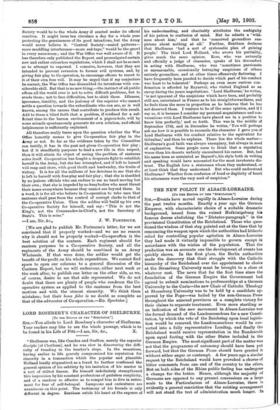LORD ROSEBERY'S CHARACTER OF SHELBURNE.
[To TIER EDITOR OF TEE "SPRCTATOR.1
SIR,-YOU allude to Lord Rosebery's character of Shelburne. Your readers may like to see the whole passage, which is to
be found in his Life of Pitt.—I am, Sir, &c., X.
"Shelburne was, like Camden and Grafton, merely the superior disciple. [of Chatham], and he was slow in discovering the diffi- culty of treading in the teacher's steps. In the meantime, having earlier in life gravely compromised his reputation for sincerity in a transaction which the popular and plausible Holland loudly stigmatised as a fraud, he further confirmed the general opinion of his subtlety by his imitation of his master in a sort of stilted finesse. He himself indefinitely strengthened this impression by his constant professions of guileless simplicity, and of a candour so effusive as to compel him to live in retire- ment for fear of self-betrayal. Lampoons and caricatures are unanimous on this point. The testimony of his friends is only different in degree. Bentham extols his heart at the expense of his understanding, and charitably attributes the ambiguity of his patron to confusion of. mind. But he admits a wild- ness about him,' and that he 'conceived groundless sus. picions about nothing at all.' Further, Bentham declares that Shelburne had a sort of systematic plan of gaining people.' The third Lord Holland, who avows his partiality, gives much the same opinion. Rose, who was naturally and officially a judge of character, speaks of his discomfort in acting with Shelburne, who was sometimes passionate or unreasonable, occasionally betraying suspicions of others entirely groundless, and at other times offensively flattering. I have frequently been puzzled to decide which part of his conduct was least to be tolerated.' Perhaps an even more curious con- firmation is afforded by Rayneval, who visited England as an envoy during the peace negotiations. Lord Shelburne,' he writes, is not ignorant of the suspicions which have been, and probably still are, entertained in France as to his straightforwardness, and he feels them the more in proportion as he believes that he has not deserved them. I venture to be of the same opinion, and if I say so, it is because I consider my personal acquaintance and con- versations with Lord Shelburne have placed me in a position to know him perfectly,' and so forth. This was in the middle of September 1782, and in December he writes, You will perhaps ask me how it is possible to reconcile the character I gave you of Lord Shelburne with his conduct relative to the equivalent for Gibraltar,' and then he explains. There lies the whole matter—. Shelburne's good faith was always exemplary, but always in need of explanation. Some people seem to think that a reputation worse than his deserts unfairly encumbered his career. But, had his name been as untainted as Bayard's, his style both in writing and speaking would have accounted for the most inveterate dis- trust. The English love a statesman whom they understand, or at least think that they understand. But who could understand Shelburne? Whether from confusion of head or duplicity of heart his utterances were the very seed of suspicion."






































 Previous page
Previous page